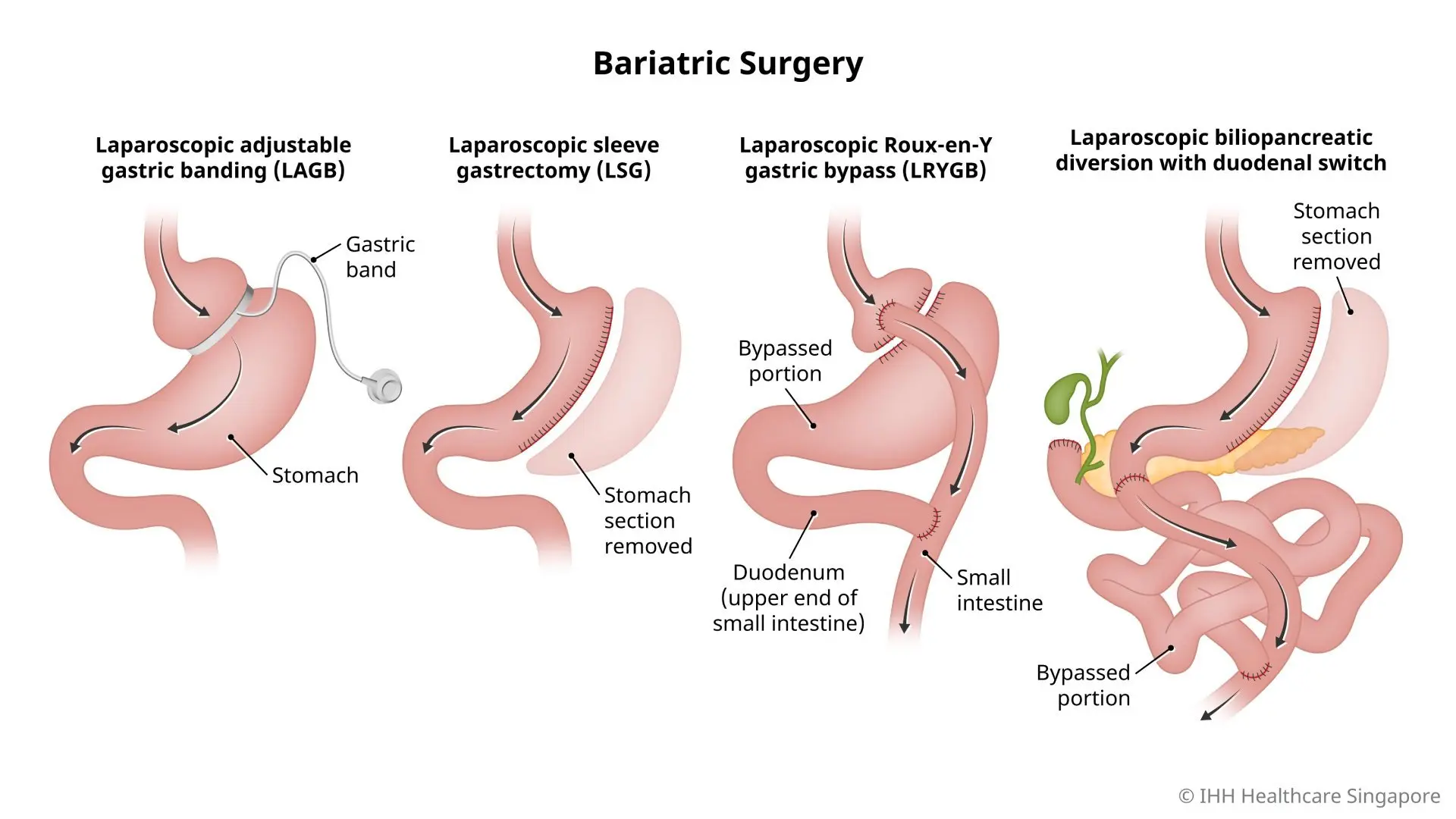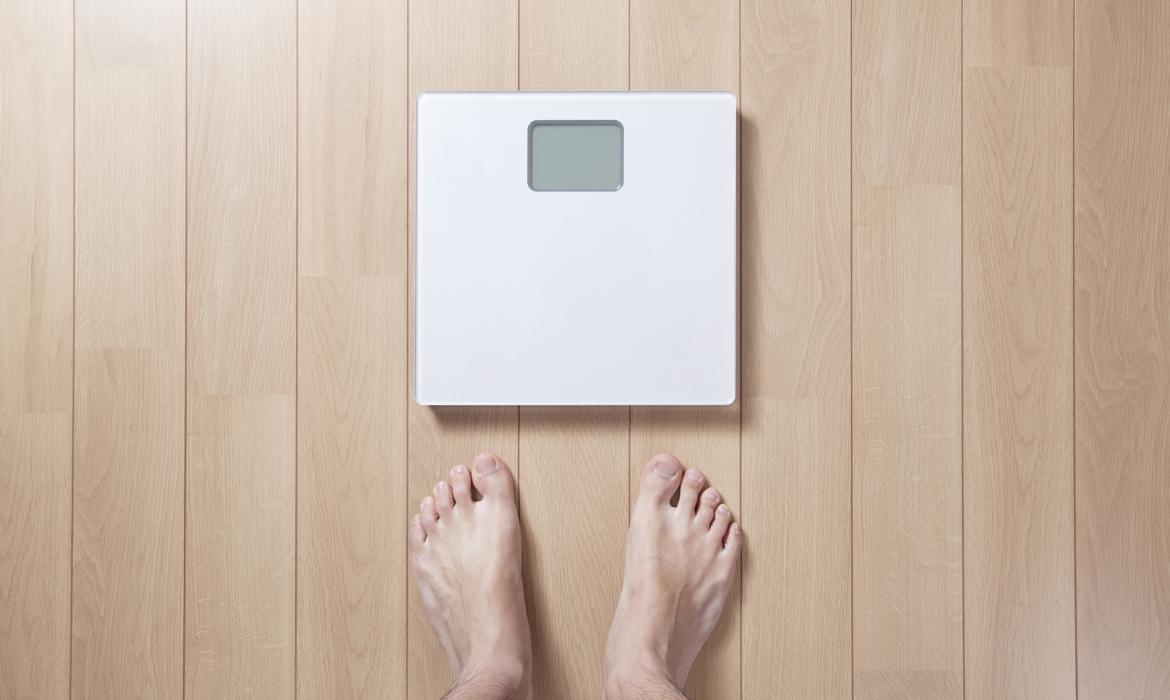What is bariatric surgery?
Bariatric surgery, also known as metabolic surgery or weight loss surgery, is a surgical intervention for obesity.
This type of surgery has been proven to be more effective than lifestyle, dietary and medical interventions in the management of obesity. It modifies different parts of the gastrointestinal (digestive) tract to bring about weight loss.
Types of bariatric surgery

There are 4 types of minimally invasive bariatric surgery:
- Laparoscopic adjustable gastric banding (LAGB), used to manage morbid obesity. This surgery reduces the size of your stomach by placing a silicone band around the upper end of the stomach. You should feel full faster, eat less, and thus lose weight.
- Laparoscopic sleeve gastrectomy (LSG), used to permanently reduce the size of your stomach to about 25% its original size, such that it resembles a sleeve or a tube.
- Laparoscopic Roux-en-Y gastric bypass (LRYGB), used to reduce the size of your stomach to a small pouch by clipping off a section of it. This small pouch is then directly attached to the small intestine, bypassing the rest of the stomach and the upper end of the small intestine.
- Laparoscopic biliopancreatic diversion with duodenal switch, used to reduce your stomach to about 25% of its original size, such that it resembles a sleeve or a tube. In this procedure, the middle section of the small intestine is clipped and the last part of the small intestine is attached directly to the duodenum. The separated middle section is reattached to the end of the intestine, bypassing most of the small intestine.
Why do you need bariatric surgery?
Bariatric surgery can successfully manage your weight and greatly improve obesity-associated disorders, such as:
To qualify for gastric bypass, your body mass index (BMI) must be:
- More than 32.5, and you must have an obesity-associated disorder such as Type 2 diabetes.
- More than 37.5.
Weight loss surgery can help you to enjoy a better quality of life and a longer lifespan. It can also help to prevent future health problems. However, you must be willing to make lifelong lifestyle changes to benefit from bariatric surgery.
Who should not undergo bariatric surgery?
Bariatric surgery may not be suitable for everyone who is severely overweight. You need to meet certain medical requirements to qualify for weight-loss surgery.
Your doctor will determine:
- Whether you are a suitable candidate
- Which procedure is best for you
What are the risks and complications of bariatric surgery?
Bariatric surgery is considered safe in general. There are some inherent risks as with all major surgery, such as:
- Infection
- Excessive bleeding
- Adverse reactions to anaesthesia
- Blood clots and deep vein thrombosis
- Intestinal leaks in staple line or joints
- Lung or breathing problems
Depending on the type of surgery, long-term complications of bariatric surgery may include:
- Bowel obstruction
- Dumping syndrome, causing diarrhoea, nausea or vomiting
- Vitamin and nutrient deficiencies
- Gallstones
- Hernias
- Ulcers
In the long-term, you may not lose the weight you hoped for and the weight may return. This usually happens if you do not stick to your doctor’s recommendations or fail to make the required lifestyle changes including adopting a healthy eating habit and regular exercise regime.
How do you prepare for bariatric surgery?
Once your doctor has cleared you for bariatric surgery, they will give you instructions on how to prepare yourself for the procedure.
You may be asked to:
- Undergo blood tests, X-rays, scans and physical examinations
- Observe diet restrictions on certain foods and drinks
- Stop certain medications
- Start an exercise regime
- Quit smoking
You may also have to plan ahead for your post-surgery recovery by arranging for help at home, if necessary.
What can you expect in bariatric surgery?
Bariatric surgery requires a high level of preparation to ensure a safe and successful surgery.
Estimated duration
Bariatric surgery usually lasts several hours.
Before the procedure
As bariatric surgery involves your stomach, your diet in the days leading to the procedure is especially important.
Starting from 2 days before surgery, you will begin a clear liquid diet to prepare your digestive tract for surgery. This ensures that your stomach and intestines are mostly empty and that you remain hydrated.
Clear liquid food and drink options include:
- Water
- Broth
- Iced tea
- Sports drinks
- Sugar-free drinks
- Strained soups with no solids
- Protein drinks, but please check with your doctor first
You must refrain from all sugary, fatty and alcoholic food and beverages.
Around noon on the day before surgery, you will consume laxatives to clear your bowel.
From midnight before surgery, you must fast from all foods and drinks. You must also avoid swallowing water while brushing your teeth and rinsing.
During the procedure
All bariatric surgery is done using general anaesthesia. This means you will be asleep during surgery and will not feel any pain.
While some weight-loss surgeries are done with traditional large incisions in your abdomen, most types of bariatric surgery are performed using a laparoscope. This is a small, tubular instrument with a camera attached. Your surgeon will make small incisions in your abdomen and insert the laparoscope to navigate and perform the procedure on your stomach.
After the procedure
You will be transferred to a recovery room, where you will be closely monitored. Depending on the procedure, you may need to stay for a few days in the hospital.
You may not be allowed to eat for 1 – 2 days to allow your stomach and digestive system to heal. You will be on a water-only diet.
Care and recovery after bariatric surgery
After going through bariatric surgery, you will need to make the following lifestyle changes to recover smoothly and avoid putting on weight.
Nutrition
You will be on a liquid or soft food diet in the weeks after the surgery. You will gradually progress to a normal, balanced diet which you need to follow permanently.
During your recovery, you are advised to:
- Eat slowly and chew carefully.
- Only eat small amounts at a time.
- Avoid foods that can block your stomach, such as soft white bread.
- Take vitamin and mineral supplements.
Exercise
Once you have recovered from your surgery, you need to start an exercise plan and maintain it for life. The aim is to help you lose as much weight as possible after the operation.
Below are some moderate to vigorous physical activities to keep your heart rate up and burn fats:
- Brisk walking
- Gardening or housework
- Swimming
- Cycling
Regular follow-up appointments
You will be asked to attend regular follow-up appointments to monitor your health, especially for the first 2 years. After that, a check-up with a general practitioner once a year will suffice.
During follow-up appointments, your doctor may order:
- Blood tests to check your vitamin and mineral levels
- A physical health check
Your doctor may also advise you on your diet and exercise. Learn more about bariatric surgery and the post-surgery recovery process.
Pregnancy and contraception
Women are usually advised to avoid becoming pregnant in the first 12 – 18 months after bariatric surgery. Weight loss surgery can negatively affect your vitamin and mineral levels, which could harm your baby.
You will be advised to:
- Use contraception until your doctor advises that it is safe to become pregnant. Check with your doctor about the best type of contraceptives, as not all are suitable for women post-bariatric surgery.
- Speak to your doctor if you become pregnant within 12 – 18 months after surgery. They can help check your vitamin and mineral levels, and recommend supplements to take.

 Brain & Spine Care
Brain & Spine Care






